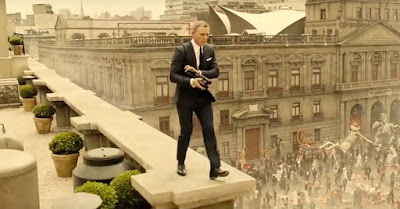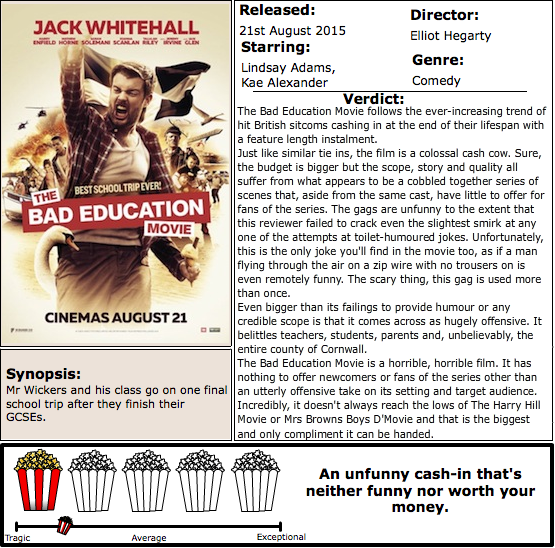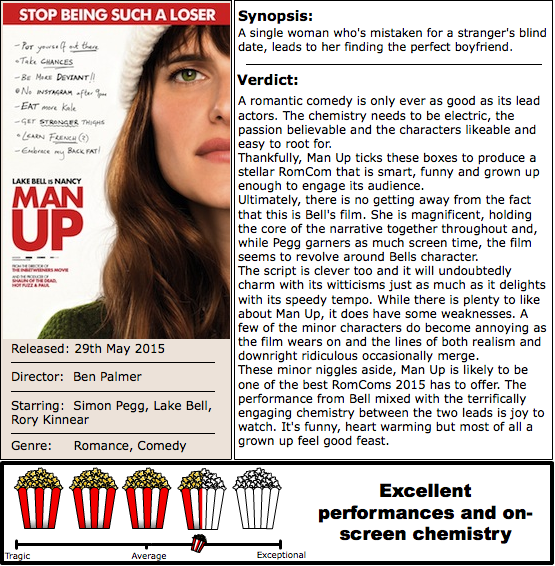This fourth outing for
Daniel Craig's Bond sees the famed spy investigate and uncover the truth behind
terrorist organisation SPECTRE.
In true 007 style we are
taken to a plethora of locations including Mexico, Italy, Austria and plenty
more. While exotic sets may not achieve the same awe-inspiring reaction as they
did in the early Bonds, all of the locations here not only look terrific but
also fit perfectly into the themes of the narrative. This statement is no truer
than in the films opening sequence, a five-minute scene based during the Day of
the Dead festival in Mexico City. Themes of death, mystery, intrigue and power
are all represented, setting the tone for the rest of the movie.
 Worldwide locations are not the only regular
feature in the Bond franchise. We've also come to expect exotic cars, beautiful
women, perilous action sequences, a dastardly villain and, of course, gadgets
galore. I'm thrilled to report then, that SPECTRE features all of this and more
in its lengthy 140-minute runtime. The action scenes in particular steal the
show here and are a breath-taking smorgasbord of vehicular chases, shootouts
and explosions. After 23 previous entries, It is tough to do anything overly
original with these scenes, but SPECTRE puts on an exhilarating show
nonetheless. There are even nods to the high octane moments of previous 007
films with one scene in particular bringing back memories of On Her Majesty's
Secret Service. With scenes like this, it's tough to think anyone will struggle
to have plenty of enjoyment and nostalgic pleasure here.
Worldwide locations are not the only regular
feature in the Bond franchise. We've also come to expect exotic cars, beautiful
women, perilous action sequences, a dastardly villain and, of course, gadgets
galore. I'm thrilled to report then, that SPECTRE features all of this and more
in its lengthy 140-minute runtime. The action scenes in particular steal the
show here and are a breath-taking smorgasbord of vehicular chases, shootouts
and explosions. After 23 previous entries, It is tough to do anything overly
original with these scenes, but SPECTRE puts on an exhilarating show
nonetheless. There are even nods to the high octane moments of previous 007
films with one scene in particular bringing back memories of On Her Majesty's
Secret Service. With scenes like this, it's tough to think anyone will struggle
to have plenty of enjoyment and nostalgic pleasure here.
The main villain in SPECTRE is played by
Christoph Waltz, the double Academy Award winner who, with his roles in Django
Unchained and Inglorious Basterds, has recently put in some of the finest
performances in modern day Hollywood. Here, he plays the leader of the
terrorist group SPECTRE and is, for much of the first half of the film, notable
in his lack of screen time. It is a brave move to omit such an impactful actor
for sections of the film, but this works in building up the mystery behind his
character, turning him into somewhat of an enigma. His introduction to the film
is a terrific one as he sits, head of a giant table surrounded by the followers
of SPECTRE as they deliberate over the impending terror attacks across the
world and discuss those that have gone before. His face is shrouded in darkness
and the power radiating from him strikes fear in those awaiting his orders.
This is one of the few scenes he is featured in during the early stages of the
film and it is not until the latter stages where we truly solve the mystery
behind his character. While it's commendable that the character is given time
to develop as an enigma, the execution when he finally does receive ample
screen time is somewhat anticlimactic. It's apparent that the strengths of
Waltz aren't fully utilised and, while far from being an ineffective villain, his impact on the film is not as strong as
it needs to be, nor as dominant as we are led to believe. Knowing how terrific
Waltz can be makes this point all the more disappointing.
By now, many viewers will have made their mind
up on their opinions of Daniel Craig as James Bond. While there are small
factions that dislike his take on the secret agent, the general consensus is
that he is one of the most successful to date. His turn in all three of his
Bond entries has been impressive and consistent and little has changed here.
Right from the off in Casino Royale he has certainly looked comfortable and,
throughout his Bond career, has delivered one of the most intense and gritty
versions of the character while still being capable of dispensing the charm and
delivering the cheesy one liners. In SPECTRE, he effectively delivers his most
traditionally styled Bond performance yet, showing he can adapt to whatever
direction he is asked to take. Aside from Craig's performance, the other
standout turns come from Ben Whishaw as Q and Naomie Harris as Moneypenny. Both
are relatively new to the franchise and have done well to fit into their
integral roles so quickly. Lea Seydoux effectively plays the traditional Bond
girl, but in a more empowering way than the entries of old. Her story arc is
impressive in it's simplicity to alter the main narrative and she is certainly
one of the most assertive characters on screen, looking comfortable in her role
from the off. At 30 years of age, her CV is full of depth and she demonstrates
how talented she is here.
One of the main decisions that appear to have
been taken in the development of SPECTRE is to make it more of a traditional
entry into the franchise, something that Skyfall and Casino Royale shied away
from. Skyfall in particular played out more in the style of a Bourne movie,
stripping away some of the classic traits and instead opting for a darker, more
brooding atmosphere coupled with, dare I say it, more realism. It's interesting
to note that as the Daniel Craig films have progressed, so too have the
similarities to Bonds of old. It's a logical progression when you think that
this mini series in the franchise began with the origins of Bond and that we
are now moving into the narrative streams that connect to the original films.
This progression is no more evident than in SPECTRE and, needless to say, this
entry is not similar to its immediate predecessors. Because of this, the film
does feel void of much originality and, as mentioned earlier, trying to create
a classic Bond film with new ideas after 23 previous entries is a nigh on
impossible task. There is a feeling that SPECTRE does buckle under the weight
of all of those entries before it and those going in expecting to see a direct
follow up in the style of previous Craig films will be left with an overriding
feeling of disappointment. That's not to say that using the tried and tested
formula that has made Bond such a beloved character is a misstep, it's more the
stark reliance on those classics make for a film that feels familiar and solid
rather than fresh and exciting. Even the theme song, a marvellous track from
Sam Smith, is delivered in a classic approach, which contrasts the Craig
films before it.
































































